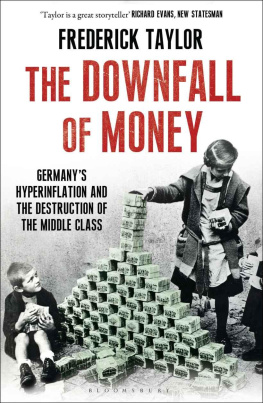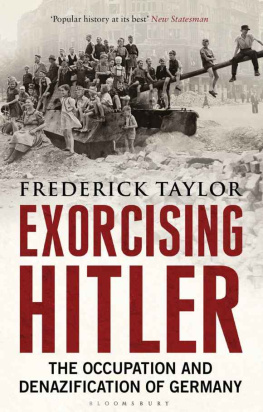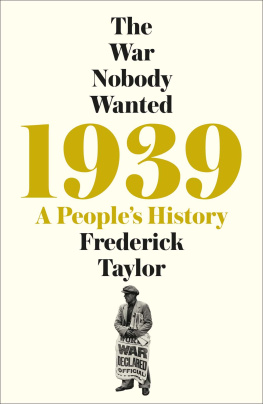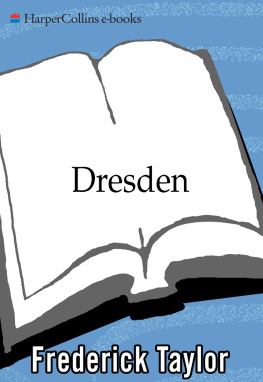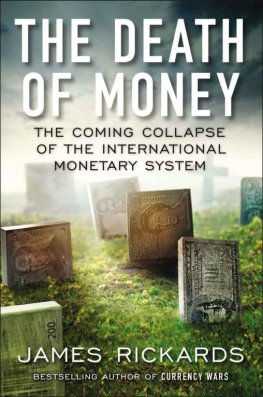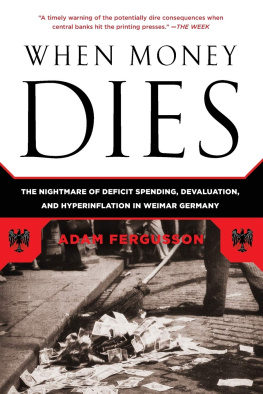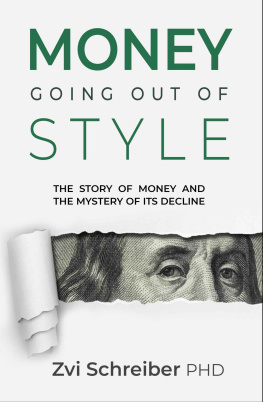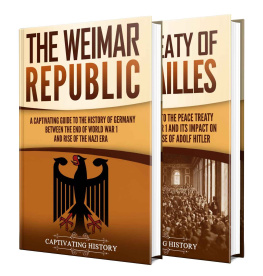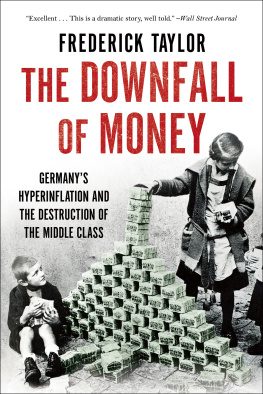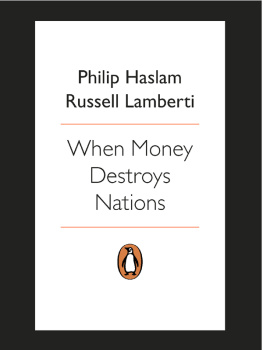
For Alice
At the outset the masses misinterpreted it as nothing more than a scandalous rise in prices; only later, under the name of inflation, t he process was correctly comprehended as the downfall of money.
- Konrad Heiden, Der Fhrer: Hitlers Rise to Power (1944)
By a continuing process of inflation, governments can confisca t e, secretly and unobserved, an important part of the wealth of t heir citizens. By this method, they not only confiscate, but they confiscate arbitrarily; and, while the process impoverishes many, it ac t ually enriches some. The sight of this arbitrary rearrangement of riches strikes not only at security, but at confidence in the equity of t he existing distribution of weal t h.
- John Maynard Keynes
Inflation is a crowd phenomenon... one can describe it as a wi t ches Sabbath of devaluation where men and the units of their money have the strongest effects on each other. The one stands for the o t her, men feeling themselves as bad as their money; and this becomes worse and worse. Together they are all at its mercy and all feel equally wor t hless.
- Elias Canetti, Crowds and Powe r
Believe me, our misery will increase. The scoundrel will get by. But t he decent, solid businessman who doesnt speculate will be u tt erly crushed; first the little fellow on the bottom, but in the end the big fellow on top too. But the scoundrel and the swindler will remain, t op and bottom. The reason: because the state itself has become t he bigges t swindler and crook. A robbers s t a t e!
- Adolf Hitler, 1923
There is no subtler, no surer means of overturning the existing basis of society than to debauch the currency.
- Vladimir Ilyich Lenin (a tt r.)
Contents
This book seeks to provide a narrative description of the origins, progression and effects of the German hyperinflation and to place this extraordinary phenomenon in the turbulent, ominous human context of the world in which it occurred. It is not by any means a book about economics in the narrow sense. The ills of the German currency between 1914 and 1924 arose out of, and then fed back into, the ills of the country itself. It contains elements of economic explanation, without which there would be no background to the story. It is, however, also about war, politics, greed, anger, fear, defiance, desire and (a key element, even if usually in short supply at that time) hope, and the way in which all these things affected and reflected the lives of ordinary people. The history caused the economics, the economics brought on more history, and back and forth and so it went, in a dizzying and frightening continuation that, even when it appeared to end, haunted and arguably still haunts the German national narrative.
Nine decades ago, the most populous, technologically advanced and industrious country in continental Europe had suffered a terrible reversal of fortune. Germany had fought and lost a great war that cost her 2 million young men dead, large chunks of territory and vast amounts of treasure. Vengeful enemies had declared their intention to make Germany pay, not just for her own expenses of that war, but for theirs too. Meanwhile, the hereditary dynasties that had ruled in Germany for a thousand years, grand symbols of stability and continuity, were overthrown in a matter of days remarkably easily, in fact by their mutinous subjects, who blamed them, the archetypal warlords, for not leading Germany to victory.
The familiar, once unshakeable representatives of the monarchical state had been replaced in November 1918 by parliamentary politicians who, whatever their virtues, lacked both the glamour of aristocracy and the authority that it had seemed, however spuriously, to confer. Those politicians, many from humble backgrounds and experiencing real power for the first time, knew that the future of the new post-war Germany depended on producing order from chaos, prosperity from deprivation, respect from humiliation. They were also determined that, despite the defeat of the Reichs armies and the harsh demands of the countries that had vanquished them, the ordinary German people, who had suffered so much in four bitter years of war, should be able to look forward to a better, more secure future. The question was, given the countrys problems, the demands of the victorious enemy and the (literally) murderous divisions in German society, could these men on the whole rather ordinary individuals succeed in this awesomely difficult task?
The state the politicians coaxed into being after the revolution came to be known as the Weimar Republic. The constitution-makers who met in early 1919 had been forced to evacuate themselves from Berlin to this attractive, modest-sized central German city (population at the end of the Second World War around 35,000), because the capital was still too violent and politically unstable for their safety to be guaranteed. They remained there until the situation in Berlin was somewhat restored.
Weimar had become famous 120 years or so previously as the home of the great writer Johann Wolfgang von Goethe, Germanys Shakespeare - and more. In a long life, spanning the eighteenth and nineteenth centuries, Goethe had also gained renown as a statesman and scientist. A fitting environment for Germanys new start, perhaps, despite the circumstances. From now on, though, to the wider world the first thing the name would bring to mind would no longer be the greatest achievements of the German enlightenment. Instead, it would conjure up the struggles, and eventually the failure, of the first German democracy. Beyond this, we now know, lay the rise of Hitler and the most terrible war in human history.
In some important ways, though, for all its problems the fifteen-year democratic interlude represented a signpost to the future. Our future. It was a consumer society. It had cinemas and shops, a lively and astonishingly free press, and sports events of a scale and popularity unknown just a few years earlier in more untroubled times. And, even while the inflation was laying waste to some parts of the economy, Germany had its first passenger airlines, opening up global opportunities for business and pleasure for its citizens. It also saw the beginnings of radio broadcasting to a public as eager for distraction as its twenty-first-century counterparts.
Nonetheless, because of what followed, Weimar would become an adjective, ruefully affixed to indicate something well-meaning and even brilliant, but fatally divided and doomed. Weimar Republic. Weimar Culture. Weimar Decadence. Weimar Inflation.
This, then, is the core of the story that will be told here. But it would be of academic interest if we couldnt keenly feel the resonances in our own time.
After sixty years of political stability and more or less steady economic growth, the once-solid edifice of post-war Europe finds itself in a state of decay, and facing a crisis of identity that threatens to turn ugly. The European Union, which was supposed to ensure that a third universal war would never happen, is at risk of disintegration. Hard-edged nationalism is back in fashion, and it is at least in part basing itself on economic differentials. Far-right chaos-makers stalk swathes of the continent, from Budapest to Bayonne, Vienna to Vilnius. Racism and intolerance are manifested in virulent forms unseen since the 1930s. Last but not least, during the past few years the global financial tide has gone out, revealing that the apparently sound underpinnings of many European economies were in fact rickety and rotten.
These twenty-first-century countries borrowed too much and spent too much. They have been forced to tell their citizens that the generous welfare provisions and public services they have come to take for granted are unaffordable. The eurozone union was supposed to bring the continents economies into harmony and balance under a common currency. Just as the political union was designed to avoid new military conflicts, so the rise of the euro would, such was the hope, end for ever the threat of financial anarchy for countries that had suffered so much from it in the past hundred years. Now, the euros days seem numbered, and the continents future more uncertain than at any time since 1945.
Next page
